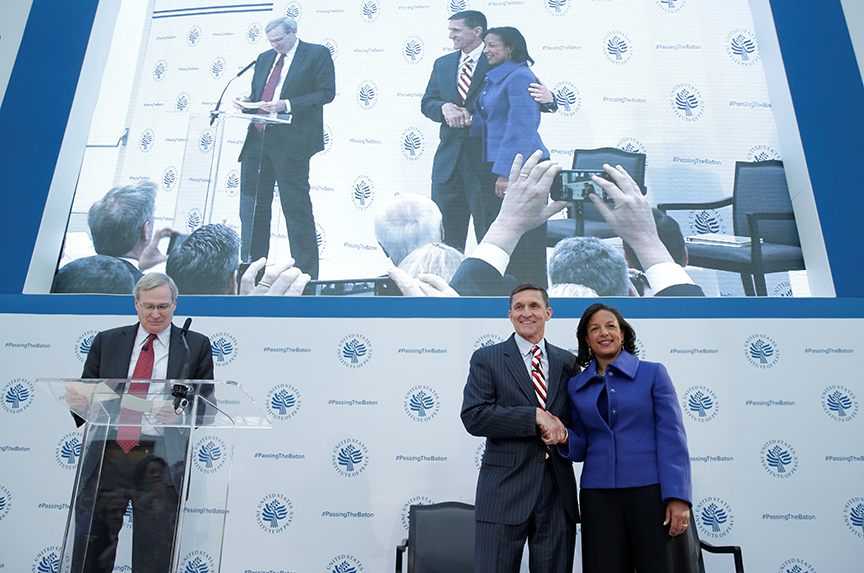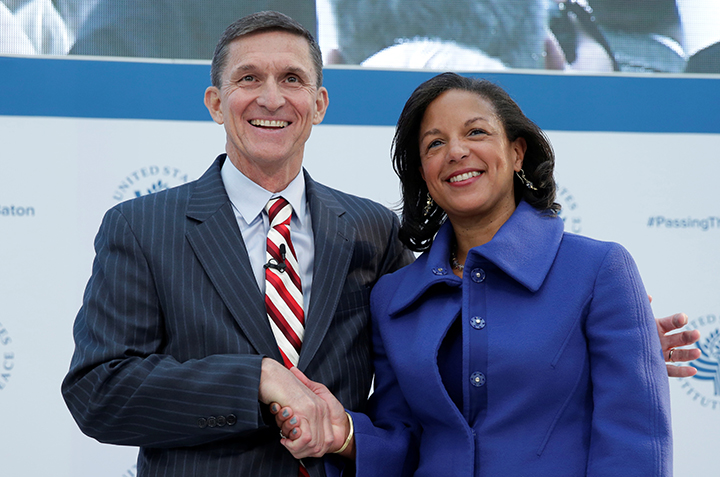 US President-elect Donald Trump’s national security advisor, retired Lt. Gen. Michael T. Flynn, on January 10 sought to reassure US allies of the incoming administration’s commitment to alliances.
US President-elect Donald Trump’s national security advisor, retired Lt. Gen. Michael T. Flynn, on January 10 sought to reassure US allies of the incoming administration’s commitment to alliances.
Flynn said the incoming National Security Council’s mission, guided by Trump’s vision to “make America great again,” will be supported by an overarching policy of “peace through strength.”
“As we examine and potentially re-baseline our relationships around the globe we will keep in mind the sacrifices and deep commitments that many of our allies and our partners have made on behalf of our security and our prosperity,” Flynn said at a conference at the US Institute of Peace that was co-hosted by the Atlantic Council.
“In fact,” he added, “alliances are one of the great tools that we have and the strength of those alliances magnify our own strengths.”
Trump’s rhetoric on the campaign trail criticizing NATO as “obsolete” and his warm words for Russian President Vladimir Putin have created unease among US allies, particularly those in Eastern Europe that live in Russia’s shadow.
Trump has said that the United States will not rush to defend NATO member states that do not live up to their financial obligations. Flynn has himself in the past said that “for countries that don’t pay their bills, there has got to be some other penalty.” At present, just five of NATO’s twenty-eight member states meet the Alliance’s goal of spending 2 percent of their GDP on defense.
But Flynn struck a softer tone on January 10. Speaking about American exceptionalism, he said: “We have always been the indispensable nation and we always will be… Whether we like it or not, the world needs us.”
Flynn said his National Security Council will continue to serve as the fulcrum of national security decisionmaking. He said the council will advise Trump, formulate national security policy, monitor the execution of this policy, and ensure that the president is well prepared to face any national security challenges.
Flynn was joined on stage at the US Institute of Peace by US National Security Advisor Susan Rice.
Rice made an appeal for the future of the Trans-Pacific Partnership (TPP), a trade agreement that includes the United States and countries in Latin America and Asia. The TPP’s future is uncertain as the US Congress has not passed the deal, which aims to set the rules of the road for trade, and Trump has vowed to pull out of the pact on his first day in office.
Rice said through the TPP, Obama had fought to set rules of the road for trade that ensure fair competition, protect the environment, and raise labor standards. “If we don’t define these rules of the road, others will,” she said. “China is already pursuing its own regional trade agreement, with lower standards and fewer protections. Failure to move forward on TPP is eroding American regional leadership and credibility, with China standing to gain strategically and economically,” she added.
Challenges ahead
Rice said she and Flynn have had constructive meetings during the course of the transition between administrations.
Speaking at the conference earlier in the day, US Secretary of State John Kerry said there had been no high-level meetings between State Department officials and Trump’s transition team. Kerry said he has yet to meet his successor, ExxonMobil Chief Executive Officer Rex Tillerson.
Noting that the presidential election concluded on November 8 had been tough, Rice added: “our national security is and must always remain above the fray.” She spelled out some of the chief accomplishments of the outgoing Obama administration and listed the national security challenges for which the Trump administration must prepare.
As a consequence of strategic foreign policy decisions taken by the Obama administration, the United States is better positioned to confront the formidable challenges that will face Trump, said Rice.
She spelled out three main challenges. First, Americans face an array of threats from a diverse set of sources—state actors like Russia and Iran, and terrorists like the Islamic State of Iraq and al-Sham and transnational threats like climate change, pandemics, and the illicit flow of drugs and weapons.
Second, the United States faces the challenge of upholding an international order that is strained by rising tensions among major global and regional powers, according to Rice. Europe, which faces the challenge of the United Kingdom’s impending exit from the European Union, economic uncertainty, a migrant crisis, and Russian aggression, needs US assistance, she said. China is posing challenges to the US-China relationship through its actions in the South China Sea. And the Arab world, rocked by conflict, is struggling to achieve stability.
“In the face of these challenges, it might be tempting to turn inward,” said Rice, adding that this is where the United States will face its third strategic challenge.
“We must protect ourselves and the international order we helped build without subordinating our values or abandoning our alliances, partnerships, and cooperation that have yielded unprecedented global prosperity and progress,” she added.

US National Security Adviser Susan Rice and her incoming successor, retired Army Lt. Gen. Michael T. Flynn, shook hands at the “Passing the Baton 2017” conference in Washington on January 10. (Reuters/Yuri Gripas)
‘Are we looking around the corner?’
Rice noted that when US President Barack Obama took office in January of 2009 the US economy was in free-fall, the United States was involved in wars in Iraq and Afghanistan, and al Qaeda had regrouped along the border of Afghanistan and Pakistan.
Obama “knew we had to laser-focus on these immediate challenges,” said Rice, but, “he always kept the long-game in mind, too.” This meant investing in the foundations of American strength and influence—especially economic strength; countering global threats; not overextending in places less central to US long-term interests, while rebalancing toward regions that are; and tackling complex transnational threats.
“As President Obama always asks, ‘Are we looking around the corner?’ By looking around the corner, with the work of this Administration and our partners, today the United States is positioned more strategically to meet the challenges ahead,” said Rice.
Among the successes notched up on Obama’s watch, Rice listed the deal that cuts off Iran’s path to a nuclear bomb and counterterrorism partnerships that have resulted in the death of al Qaeda leader Osama bin Laden in Pakistan in 2011, the degradation of core al Qaeda, and the rolling back of the Islamic State of Iraq and al-Sham’s territorial gains in Iraq and Syria. She also pointed to the historic diplomatic opening with Cuba, which she said has led to an improvement in US ties in Latin America and a peace deal with leftist rebels in Colombia; expanded access to electricity in Africa; deepened transatlantic ties; a historic $38 billion military assistance package for Israel; and sanctions on Russia for its aggression in Ukraine.
Referring to China, a country that Trump has repeatedly taunted on the campaign trail as well as on Twitter, Rice contended: “While managing our complex but increasingly durable relationship with China, we’ve strengthened cooperation with treaty allies like Japan, South Korea, and Australia; forged deeper partnerships with emerging powers like India and Indonesia; and intensified our support for regional institutions.”
Ashish Kumar Sen is deputy director of communications at the Atlantic Council. You can follow him on Twitter @AshishSen.
Image: US National Security Adviser Susan Rice (right) and her incoming successor, retired Lt. Gen. Michael T. Flynn, shook hands at a symbolic passing of the baton at the US Institute of Peace in Washington on January 10. Stephen J. Hadley, a former national security advisor and current executive vice chair of the Atlantic Council board, is on the left. (Reuters/Yuri Gripas)
